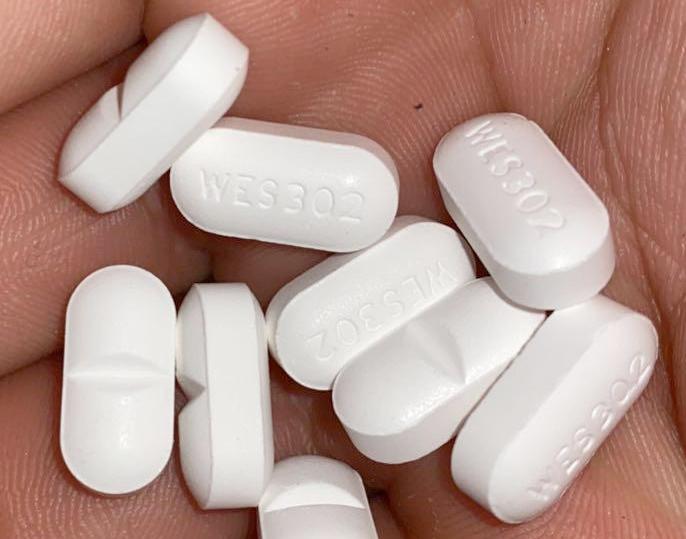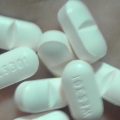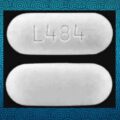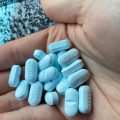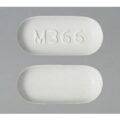The white, capsule-shaped pill with the imprint WES 302 has been identified as a combination drug containing acetaminophen 325 mg / hydrocodone bitartrate 7.5 mg. It is supplied by Eywa Pharma Inc..
WES 302 pill is used to relieve moderate to severe pain. It contains an opioid pain reliever (hydrocodone) and a non-opioid pain reliever (acetaminophen). Hydrocodone works in the brain to change how your body feels and responds to pain. Acetaminophen can also reduce a fever.
What should I tell my health care provider before I take WES 302 pill?
They need to know if you have any of these conditions:
- brain tumor
- Crohn’s disease, inflammatory bowel disease, or ulcerative colitis
- drug abuse or addiction
- head injury
- heart or circulation problems
- if you often drink alcohol
- kidney disease or problems going to the bathroom
- liver disease
- lung disease, asthma, or breathing problems
- an unusual or allergic reaction to acetaminophen, hydrocodone, other opioid analgesics, other medicines, foods, dyes, or preservatives
- pregnant or trying to get pregnant
- breast-feeding.
How should I take WES 302 pill?
Read the Medication Guide and, if available, the Patient Information Leaflet provided by your pharmacist before you start taking this medication and each time you get a refill. If you have any questions, ask your doctor or pharmacist.
Take this medication by mouth as directed by your doctor. You may take this drug with or without food. If you have nausea, it may help to take this drug with food. Ask your doctor or pharmacist about other ways to decrease nausea (such as lying down for 1 to 2 hours with as little head movement as possible).
If you are using a liquid form of this medication, use a medication measuring device to carefully measure the prescribed dose. Do not use a household spoon because you may not get the correct dose.
The dosage is based on your medical condition and response to treatment. In children, the dosage is also based on weight. Do not increase your dose, take the medication more frequently, or take it for a longer time than prescribed. Properly stop the medication when so directed.
Pain medications work best if they are used as the first signs of pain occur. If you wait until the pain has worsened, the medication may not work as well.
If you have ongoing pain (such as due to cancer), your doctor may direct you to also take long-acting opioid medications. In that case, this medication might be used for sudden (breakthrough) pain only as needed. Other pain relievers (such as ibuprofen, naproxen) may also be prescribed. Ask your doctor or pharmacist about using this product safely with other drugs.
Suddenly stopping this medication may cause withdrawal, especially if you have used it for a long time or in high doses. To prevent withdrawal, your doctor may lower your dose slowly. Tell your doctor or pharmacist right away if you have any withdrawal symptoms such as restlessness, mental/mood changes (including anxiety, trouble sleeping, thoughts of suicide), watering eyes, runny nose, nausea, diarrhea, sweating, muscle aches, or sudden changes in behavior.
When this medication is used for a long time, it may not work as well. Talk with your doctor if this medication stops working well.
Though it helps many people, this medication may sometimes cause addiction. This risk may be higher if you have a substance use disorder (such as overuse of or addiction to drugs/alcohol). Take this medication exactly as prescribed to lower the risk of addiction. Ask your doctor or pharmacist for more details.
Tell your doctor if your pain does not get better or if it gets worse.
What may interact with this medicine?
This medicine may interact with the following medications:
- alcohol
- antiviral medicines for HIV or AIDS
- atropine
- antihistamines for allergy, cough and cold
- certain antibiotics like erythromycin, clarithromycin
- certain medicines for anxiety or sleep
- certain medicines for bladder problems like oxybutynin, tolterodine
- certain medicines for depression like amitriptyline, fluoxetine, sertraline
- certain medicines for fungal infections like ketoconazole and itraconazole
- certain medicines for Parkinson’s disease like benztropine, trihexyphenidyl
- certain medicines for seizures like carbamazepine, phenobarbital, phenytoin, primidone
- certain medicines for stomach problems like dicyclomine, hyoscyamine
- certain medicines for travel sickness like scopolamine
- general anesthetics like halothane, isoflurane, methoxyflurane, propofol
- ipratropium
- local anesthetics like lidocaine, pramoxine, tetracaine
- MAOIs like Carbex, Eldepryl, Marplan, Nardil, and Parnate
- medicines that relax muscles for surgery
- other medicines with acetaminophen
- other narcotic medicines for pain or cough
- phenothiazines like chlorpromazine, mesoridazine, prochlorperazine, thioridazine
- rifampin
This list may not describe all possible interactions. Give your health care provider a list of all the medicines, herbs, non-prescription drugs, or dietary supplements you use. Also tell them if you smoke, drink alcohol, or use illegal drugs. Some items may interact with your medicine.
What should I watch for while using this medicine?
Tell your doctor or health care professional if your pain does not go away, if it gets worse, or if you have new or a different type of pain. You may develop tolerance to the medicine. Tolerance means that you will need a higher dose of the medicine for pain relief. Tolerance is normal and is expected if you take the medicine for a long time.
Do not suddenly stop taking your medicine because you may develop a severe reaction. Your body becomes used to the medicine. This does NOT mean you are addicted. Addiction is a behavior related to getting and using a drug for a non-medical reason. If you have pain, you have a medical reason to take pain medicine. Your doctor will tell you how much medicine to take. If your doctor wants you to stop the medicine, the dose will be slowly lowered over time to avoid any side effects.
There are different types of narcotic medicines (opiates). If you take more than one type at the same time or if you are taking another medicine that also causes drowsiness, you may have more side effects. Give your health care provider a list of all medicines you use. Your doctor will tell you how much medicine to take. Do not take more medicine than directed. Call emergency for help if you have problems breathing or unusual sleepiness.
Do not take other medicines that contain acetaminophen with this medicine. Always read labels carefully. If you have questions, ask your doctor or pharmacist.
If you take too much acetaminophen get medical help right away. Too much acetaminophen can be very dangerous and cause liver damage. Even if you do not have symptoms, it is important to get help right away.
You may get drowsy or dizzy. Do not drive, use machinery, or do anything that needs mental alertness until you know how this medicine affects you. Do not stand or sit up quickly, especially if you are an older patient. This reduces the risk of dizzy or fainting spells. Alcohol may interfere with the effect of this medicine. Avoid alcoholic drinks.
The medicine will cause constipation. Try to have a bowel movement at least every 2 to 3 days. If you do not have a bowel movement for 3 days, call your doctor or health care professional.
Your mouth may get dry. Chewing sugarless gum or sucking hard candy, and drinking plenty of water may help. Contact your doctor if the problem does not go away or is severe.
What are the side effects of WES 302 pill?
Side effects that you should report to your doctor or health care professional as soon as possible:
- allergic reactions like skin rash, itching or hives, swelling of the face, lips, or tongue
- breathing problems
- confusion
- redness, blistering, peeling or loosening of the skin, including inside the mouth
- signs and symptoms of low blood pressure like dizziness; feeling faint or lightheaded, falls; unusually weak or tired
- trouble passing urine or change in the amount of urine
- yellowing of the eyes or skin
Side effects that usually do not require medical attention (report to your doctor or health care professional if they continue or are bothersome):
- constipation
- dry mouth
- nausea, vomiting
- tiredness
This list may not describe all possible side effects. Call your doctor for medical advice about side effects. You may report side effects to FDA at 1-800-FDA-1088.
Where should I keep my medicine?
Keep out of the reach of children. This medicine can be abused. Keep your medicine in a safe place to protect it from theft. Do not share this medicine with anyone. Selling or giving away this medicine is dangerous and against the law.
Store at room temperature between 15 and 30 degrees C (59 and 86 degrees F).
This medicine may cause harm and death if it is taken by other adults, children, or pets. Return medicine that has not been used to an official disposal site. Contact the DEA at 1-800-882-9539 or your city/county government to find a site. If you cannot return the medicine, flush it down the toilet. Do not use the medicine after the expiration date. ALSO SEE: WES 303 PILL


